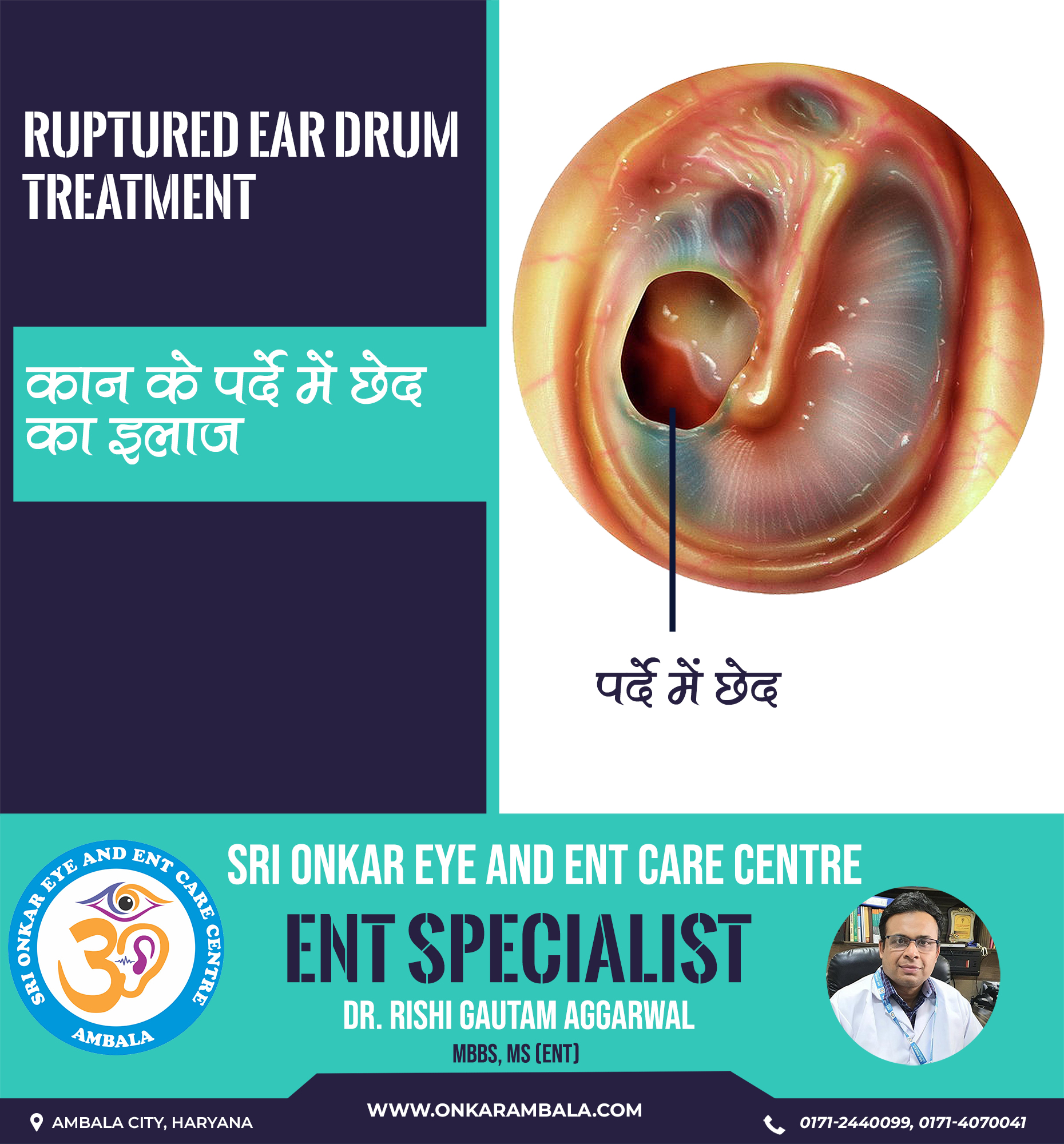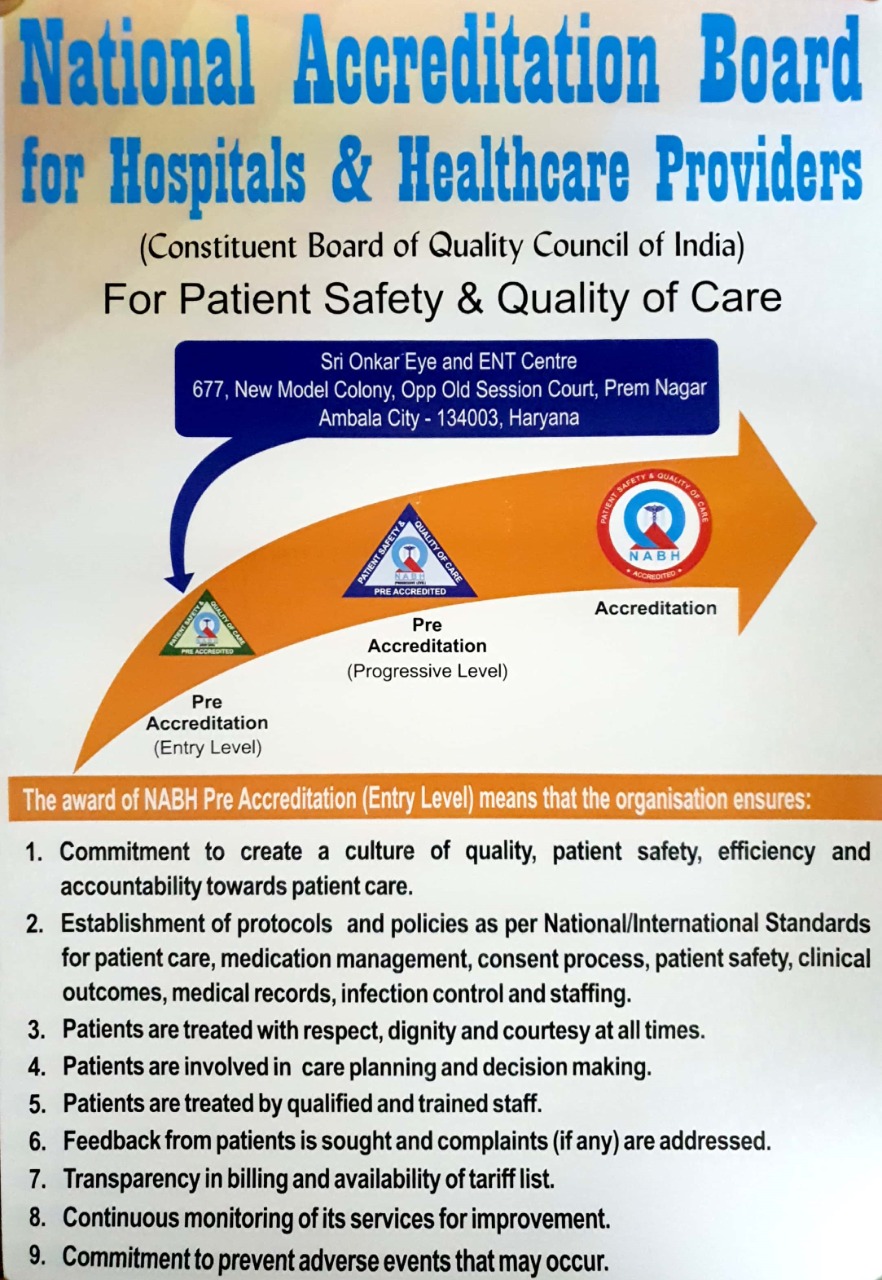
Ruptured Eardrum Treatment in Ambala | Perforated Eardrum
What is a ruptured eardrum/perforated eardrum?
Your eardrum is a thin membrane between your outer and middle ear. Sound waves entering your ear cause the membrane to vibrate. This helps you hear. An injury or infection can cause your eardrum to tear (rupture). This creates a hole (perforation) that may affect your hearing.
A ruptured eardrum (tympanic membrane perforation) can result in hearing loss. It can also make your middle ear vulnerable to infections.
A ruptured eardrum usually heals within a few weeks without treatment. But sometimes it requires a patch or surgical repair to heal.
What are the causes of eardrum perforation?
There could be various situations or reasons behind the ruptured eardrum or a perforated eardrum. A few of them are mentioned below:
- Pressure from an ear infection. Middle ear infection (otitis media). A middle ear infection often results in the accumulation of fluids in your middle ear. Pressure from these fluids can cause the eardrum to rupture.
- Foreign objects in your ear. Putting an object such as a cotton swab, bobby pin, or pencil into the ear.
- A very loud noise such as a gunshot or explosion close to the ear.
- Rapid changes in air pressure. These can happen during scuba diving or traveling at high altitudes.
- A slap or blow to the ear.
- Severe head trauma
What are the symptoms of Ruptured Eardrum
Signs and symptoms of a ruptured eardrum may include:
- Ear pain that may subside quickly
- Mucuslike, pus-filled or bloody drainage from your ear
- Hearing loss
- Ringing in your ear (tinnitus)
- Spinning sensation (vertigo)
- Nausea or vomiting that can result from vertigo

ear drum perforation treatment in Ambala | Sri Onkar Eye & ENT are Centre
What prevention one should take to avoid ruptured eardrum problems?
Follow these tips to avoid a ruptured (perforated) eardrum:
- Get treatment for middle ear infections. Be aware of the signs and symptoms of middle ear infection, including earache, fever, nasal congestion and reduced hearing. Children with middle ear infections often are fussy and may refuse to eat. Seek prompt evaluation from your primary care doctor to prevent potential damage to the eardrum.
- Protect your ears during flight. If possible, don’t fly if you have a cold or an active allergy that causes nasal or ear congestion. During takeoffs and landings, keep your ears clear with pressure-equalizing earplugs, yawning or chewing gum.Or use the Valsalva maneuver — gently pushing air into your nose, as if blowing your nose, while pinching your nostrils and keeping your mouth closed. Don’t sleep during ascents and descents.
- Keep your ears free of foreign objects. Never attempt to dig out excess or hardened earwax with items such as a cotton swab, paper clip or hairpin. These items can easily tear or puncture your eardrum. Teach your children about the damage that can be done by putting foreign objects in their ears.
- Guard against explosive noise. Avoid activities that expose your ears to explosions. If your hobbies or work involves planned activities that produce explosive noise, protect your ears from unnecessary damage by wearing protective earplugs or earmuffs.
How a doctor diagnose Eardrum Perforation?
An ENT specialist can often determine if you have a ruptured (perforated) eardrum with a visual inspection using a lighted instrument (otoscope or microscope).
He or she may conduct or order additional tests to determine the cause of your ear symptoms or to detect the presence of any hearing loss. These tests include:
- Laboratory tests:- If there’s discharge from your ear, your doctor may order a laboratory test or culture to detect a bacterial infection of your middle ear.
- Tuning fork evaluation:- Tuning forks are two-pronged, metal instruments that produce sounds when struck. Simple tests with tuning forks can help your doctor detect hearing loss.A tuning fork evaluation may also reveal whether hearing loss is caused by damage to the vibrating parts of your middle ear (including your eardrum), damage to sensors or nerves of your inner ear, or damage to both.
- Tympanometry:- A tympanometer uses a device inserted into your ear canal that measures the response of your eardrum to slight changes in air pressure. Certain patterns of response can indicate a perforated eardrum.
- Audiology exam:- This is a series of strictly calibrated tests that measure how well you hear sounds at different volumes and pitches. The tests are conducted in a soundproof booth.
What is the treatment of Ruptured Eardrum? What is Tympanoplasty?
Most ruptured (perforated) eardrums heal without treatment within a few weeks. Your doctor may prescribe antibiotic drops if there’s evidence of infection. If the tear or hole in your eardrum doesn’t heal by itself, treatment will likely involve procedures to close the tear or hole. These may include:
- Eardrum Patch:- If the tear or hole in your eardrum doesn’t close on its own, an ENT specialist may seal it with a paper patch (or a patch made of other material). With this office procedure, your ENT doctor may apply a chemical to the edges of the tear, which can promote eardrum healing, and then apply a patch over the hole. The procedure may need to be repeated more than once before the hole closes.
- Surgery:- If a patch doesn’t result in proper healing or your ENT doctor determines that the tear isn’t likely to heal with a patch, he or she may recommend surgery. The most common surgical procedure is called tympanoplasty. Your surgeon grafts a patch of your own tissue to close the hole in the eardrum. This procedure is done on an outpatient basis. In an outpatient procedure, you can usually go home the same day unless medical anesthesia conditions require a longer hospital stay.
Lifestyle and Home Remedies for ruptured eardrum
A ruptured (perforated) eardrum usually heals on its own within weeks. In some cases, healing takes months. Until your doctor tells you that your ear is healed, protect it by:
- Keeping your ear dry. Place a waterproof silicone earplug or cotton ball coated with petroleum jelly in your ear when showering or bathing.
- Refraining from cleaning your ears. Give your eardrum time to heal completely.
- Avoiding blowing your nose. The pressure created when blowing your nose can damage your healing eardrum.






